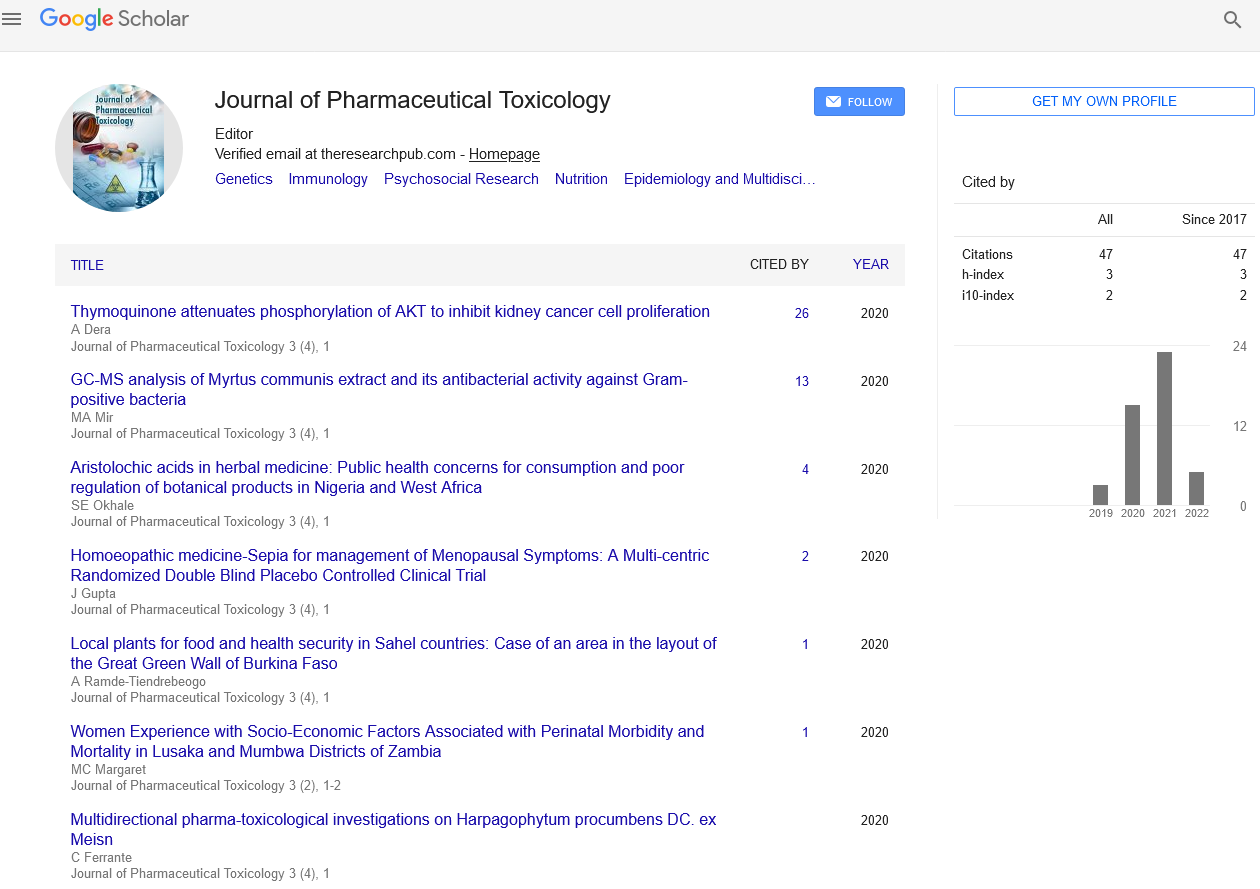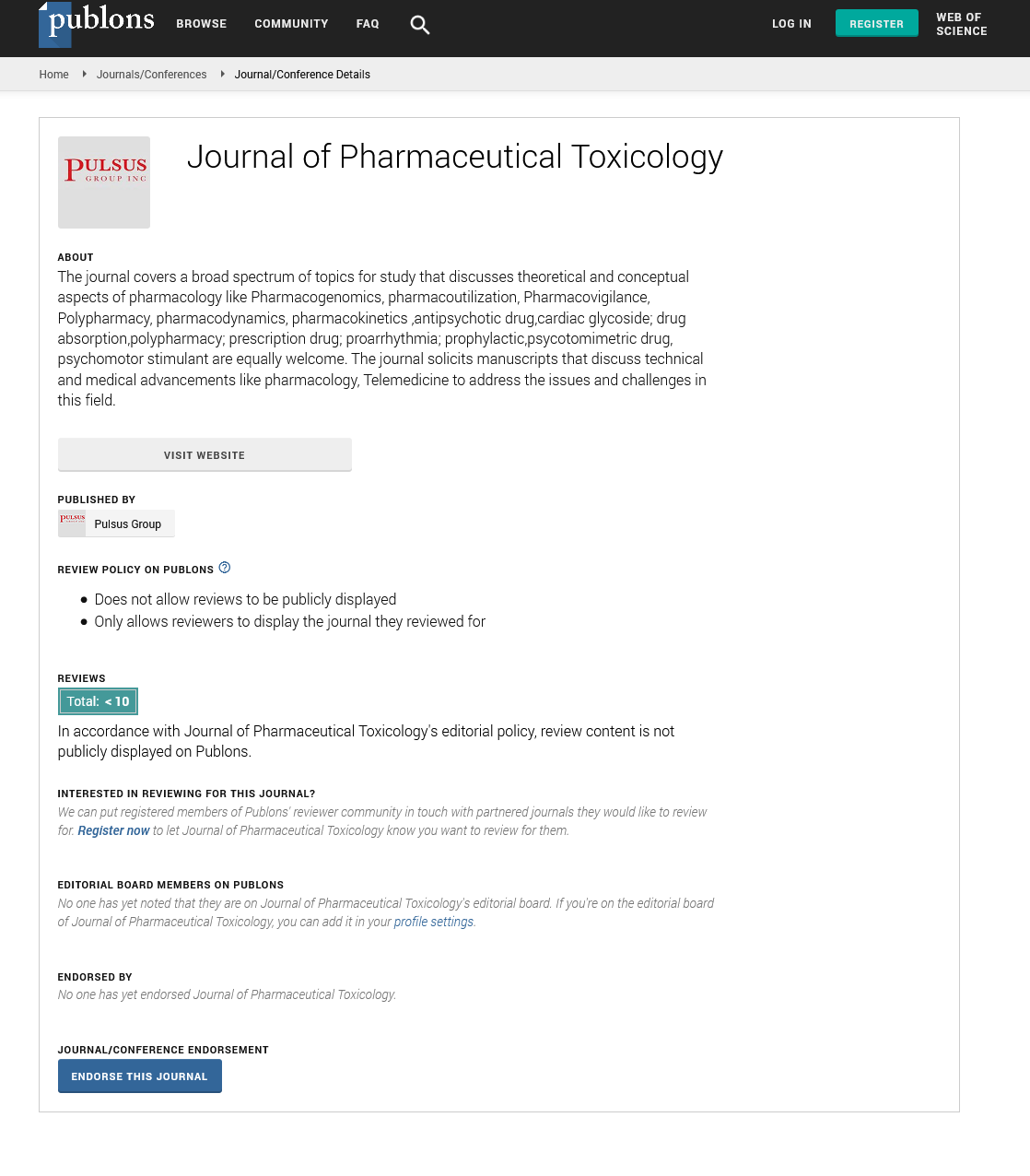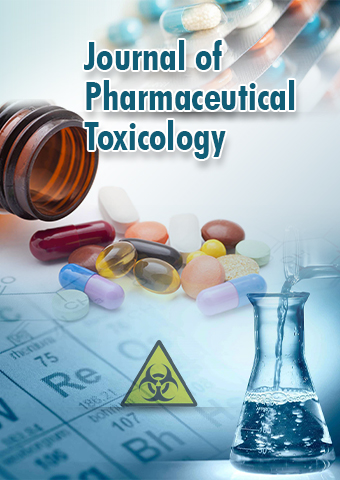Editorial - Journal of Pharmaceutical Toxicology (2023) Volume 6, Issue 3
Advancements in Precision Medicine: Transforming the Pharmaceutical Industry
Amy George*
State Key Laboratory of Bioreactor Engineering, East China University of Science and Technology, 130 Meilong Road, China
- *Corresponding Author:
- Amy George
State Key Laboratory of Bioreactor Engineering, East China University of Science and Technology, 130 Meilong Road, China
E-mail: amygeorge@edu.in
Abstract
Introduction
Precision medicine, also known as personalized medicine, is a rapidly evolving field that has the potential to revolutionize the pharmaceutical industry. It aims to tailor medical treatments to an individual’s unique genetic makeup, lifestyle, and environmental factors. This approach holds great promise for enhancing treatment efficacy, reducing adverse effects, and improving patient outcomes. In recent years, significant advancements in precision medicine have emerged, driven by breakthroughs in genomics, data analytics, and targeted therapies. This article explores some key developments in precision medicine and their implications for the pharmaceutical industry. Advancements in genomic sequencing technologies have paved the way for the identification of genetic variations associated with specific diseases. Pharmaceutical companies are increasingly incorporating genomic information into drug development processes. Targeted therapies, designed to address specific molecular alterations in patients, are becoming more prevalent. These therapies offer the potential for greater treatment effectiveness with reduced side effects, as they selectively target disease-causing mechanisms [1-3].
Pharmacogenomics is the study of how an individual’s genetic makeup influences their response to drugs. By identifying genetic markers that affect drug metabolism and response, healthcare providers can optimize medication selection and dosage for each patient. Pharmaceutical companies are actively integrating pharmacogenomic data into drug development to improve drug safety and efficacy profiles. This approach enables the development of companion diagnostics that help identify patients most likely to benefit from a specific medication. The availability of vast amounts of real-world patient data, including electronic health records, wearable devices, and social media, has opened new avenues for pharmaceutical companies. By leveraging advanced analytics and artificial intelligence, companies can extract valuable insights from this data to inform drug development and treatment decision-making. Real-world evidence can enhance clinical trial design, identify patient subgroups for targeted therapies, and support post-marketing surveillance.
The proliferation of digital health technologies, such as mobile apps, wearable devices, and telemedicine platforms, has transformed patient monitoring and engagement. These technologies enable continuous remote monitoring of patients, facilitating the collection of real-time data on symptoms, medication adherence, and treatment outcomes. Pharmaceutical companies are investing in digital health solutions to gather data that can inform drug development, improve clinical trial efficiency, and enhance patient support programs [4,5].
Recent breakthroughs in gene editing technologies, such as CRISPR-Cas9, have opened new possibilities for treating genetic disorders. Gene therapies involve modifying a patient’s genetic material to correct or replace faulty genes. Pharmaceutical companies are investing in research and development of gene therapies for various diseases, including rare genetic disorders and certain types of cancer. Although still in the early stages, gene editing has the potential to transform treatment approaches and offer hope for previously untreatable conditions.
Discuss ion
Precision medicine is reshaping the pharmaceutical industry by enabling more targeted and personalized approaches to patient care. The integration of genomics, pharmacogenomics, realworld data, digital health technologies, and gene editing has the potential to enhance treatment outcomes, improve patient safety, and streamline drug development processes. As precision medicine continues to advance, pharmaceutical companies will need to adapt their strategies and embrace these innovations to stay at the forefront of therapeutic development and delivery. By harnessing the power of precision medicine, we are entering an era of transformative healthcare that holds the promise of better health outcomes for individuals around the world. Personalized medicine is a rapidly evolving field that holds tremendous potential for transforming the way we approach healthcare. It involves tailoring medical treatments and therapies to individual patients based on their unique genetic makeup, lifestyle, and environmental factors. This approach promises to improve treatment outcomes, minimize adverse reactions, and enhance patient well-being. In recent years, significant advancements have been made in personalized medicine, leveraging innovative technologies and groundbreaking research. This article explores the latest developments in personalized medicine and their impact on the pharmaceutical industry.
One of the key pillars of personalized medicine is genomic medicine, which focuses on analyzing an individual’s DNA to gain insights into their genetic predisposition to diseases and response to specific medications. Advances in genomic sequencing technologies have made it more accessible and affordable to conduct comprehensive genetic testing. Pharmaceutical companies are now integrating genetic information into drug development processes, enabling the creation of targeted therapies that match patients’ genetic profiles. This precision medicine approach enhances treatment efficacy while reducing adverse reactions and unnecessary prescriptions.
Pharmacogenomics involves studying how an individual’s genetic variations affect their response to drugs. By analyzing genetic markers, researchers can identify patients who are more likely to experience adverse drug reactions or who may require customized dosages. Pharmaceutical companies are increasingly incorporating pharmacogenomic data into drug development to ensure safer and more effective medications. This approach allows for personalized prescribing, minimizing trialand- error scenarios and optimizing treatment outcomes. Theranostics combines therapeutic and diagnostic capabilities into a single approach. It involves using diagnostic tests to identify patients who are likely to benefit from a particular therapy or medication. Companion diagnostics are a vital component of theranostics, as they provide information on a patient’s molecular profile to guide treatment decisions. Pharmaceutical companies are investing in the development of companion diagnostics to ensure that medications are prescribed to patients who are most likely to respond positively, thereby reducing costs and improving patient outcomes [6-8].
Artificial intelligence and machine learning algorithms have gained significant traction in personalized medicine. These technologies can analyze large volumes of patient data, including genetic information, medical records, and lifestyle factors, to identify patterns, predict disease risks, and guide treatment decisions. Pharmaceutical companies are leveraging AI and ML to accelerate drug discovery and development processes, identify potential drug targets, and optimize clinical trials. Additionally, these technologies can assist in real-time patient monitoring, improving treatment adherence, and facilitating early intervention [9,10].
Conclusion
Personalized medicine encourages active patient participation in decision-making and treatment management. With the availability of genetic and diagnostic information, patients have the opportunity to make informed choices about their healthcare. Pharmaceutical companies are developing patient-centric platforms and tools that empower individuals to access and understand their genetic data, interact with healthcare providers, and actively participate in their treatment plans. This patient engagement approach fosters a collaborative relationship between patients and healthcare professionals, leading to better treatment outcomes and patient satisfaction. Personalized medicine is revolutionizing the pharmaceutical industry by shifting from a one-size-fits-all approach to a tailored, patient-centric model. Advancements in genomics, pharmacogenomics, theranostics, AI, and patient engagement are reshaping drug development, prescribing practices, and treatment management. As personalized medicine continues to evolve, it holds the promise of more precise, effective, and efficient healthcare, ultimately improving patient outcomes and transforming the way we approach medicine.
Acknowledgement
None
Conflict of Interest
None
References
- Warren KA, Bahrani H, Fox JE et al. NSAIDs in combination therapy for the treatment of chronic pseudophakic cystoid macular edema. Retina. 30, 260-266 (2010).
- Schoenberger SD, Miller DM, Petersen MR et al. Nepafenac for epiretinal membrane surgery. Ophthalmol. 118, 1482-1482 (2011).
- Friedman DS, O’Colmain BJ, Munoz B et al. Prevalence of age-related macular degeneration in the United States. Arch. Ophthalmol. 122, 564-572 (2004).
- Maloney SC, Fernandes BF, Castiglione E et al. Expression of cyclooxygenase-2 in choroidal neovascular membranes from age-related macular degeneration patients. Retina. 29, 176-180 (2009).
- Hu W, Criswell MH, Ottlecz A et al. Oral administration of lumiracoxib reduces choroidal neovascular membrane development in the rat laser-trauma model. Retina. 25, 1054-1064 (2005).
- Chen E, Benz MS, Fish MH et al. Use of nepafenac (Nevanac) in combination with intravitreal anti-VEGF agents in the treatment of recalcitrant exudative macular degeneration requiring monthly injections. Clin Ophthalmol. 4, 1249-1252 (2010).
- Gomi F, Sawa M, Tsujikawa M et al. Topical bromfenac as an adjunctive treatment with intravitreal ranibizumab for exudative age-related macular degeneration. Retina. 32, 1804-1810 (2012).
- Zhou J, Wang S, Xia X et al. Role of intravitreal inflammatory cytokines and angiogenic factors in proliferative diabetic retinopathy. Curr Eye Res. 37, 416-420 (2012).
- Harris R, Beebe-Donk J, Namboodiri KK et al. Inverse association of non-steroidal anti-inflammatory drugs and malignant melanoma among women. Oncol Rep. 8, 655-657 (2001).
- Asgari MM, Maruti SS, White E et al. A large cohort study of Nonsteroidal anti-inflammatory drug use and melanoma incidence. J Natl Cancer Inst. 100, 967-971 (2008).
Google Scholar, Crossref, Indexed at
Google Scholar, Crossref, Indexed at
Google Scholar, Crossref, Indexed at
Google Scholar, Crossref, Indexed at
Google Scholar, Crossref, Indexed at
Google Scholar, Crossref, Indexed at
Google Scholar, Crossref, Indexed at
Google Scholar, Crossref, Indexed at
Google Scholar, Crossref, Indexed at


